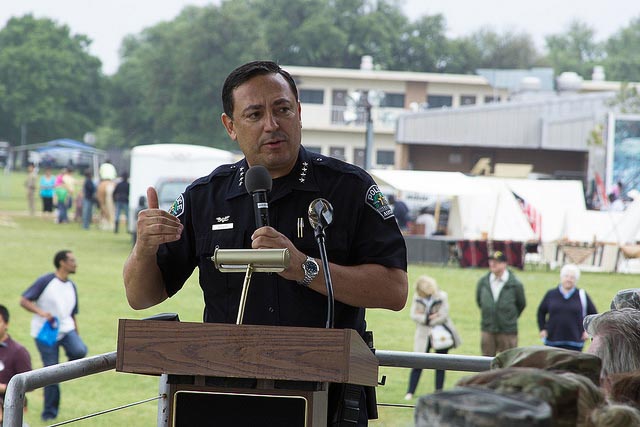Latinos are the largest ethnic group in the Houston area, representing more than 40 percent of its population. Now, following several high-profile mayoral appointments last week, Houston now has a growing number of Latino officials serving in high-profile roles too.
Houston Mayor Sylvester Turner tapped Austin Police Chief Art Acevedo to lead the police force, and he picked El Paso Fire Chief Samuel Peña was chosen to head the fire department.
They join Richard Carranza -- who was recently hired as superintendent of the Houston Independent School District after serving the same role in San Francisco -- and Ed Gonzalez, who beat incumbent Ron Hickman in the race for Harris County Sheriff.
"It is important that we have a leadership team at City Hall that is able to understand the different populations they serve," said Mayor Sylvester Turner in a statement following last week's appointments, which also included several other positions. The city of Houston is roughly 44 percent Hispanic, 26 percent white, 23 percent black and 6 percent Asian, according to the most recent census estimates.
Acevedo replaces Martha Montalvo, who had been serving as interim police chief this year. She was the city's first Hispanic police chief.
Together, the collection of leaders represent not only the city's changing demographics but a potential shift in thinking when it comes to questions of equity.
In addition to running on a platform that championed diversion programs, diversity and de-escalation training for officers and transparency, Gonzalez has promised to end Harris County's participation in a voluntary partnership with federal immigration enforcement. "The current 287(g) program is a strain on valuable police resources and taxpayer’s money," Gonzalez wrote on his campaign website, referring to the program that allows the feds to enter agreements to have state and local law enforcement to perform immigration functions. "Worse, it is a violation of due process rights and leads to racial profiling, the separation of families and a mistrust of deputies."
In Austin, Acevedo earned a reputation for reform. From an Austin American-Statesman profile of Acevedo published in October:
From his first day in July 2007, Acevedo has worked to carry out a mandate from the community, the mayor and other city leaders by creating a department that sharply scrutinizes how officers employ force and focuses on equal treatment of minorities. Central to this effort, Acevedo has tried to empower supervisors to monitor officers who violate his standards and hold them accountable.
But he also faced frustrations realizing change. In a secretly recorded tape given to the Statesman, Acevedo vented about pushback in a private meeting among high-ranking officials in August after two high-profile instances of police violence, including the shooting death of a naked and unarmed teenager, David Joseph, earlier this year. In a controversial move, Acevedo fired Geoffrey Freeman, the officer who shot Joseph, arguing he used excessive force, the newspaper wrote. "But the police union has vigorously defended him, saying that he reasonably thought Joseph was about to tackle him and possibly try to take his weapon," the newspaper reported.
In the tape, Acevedo says, "If you can’t handle a kid in broad daylight, naked, and your first instinct is to come out with your gun, and your next instinct is to shoot the kid dead, you don’t need to be a cop."
At a press conference last week, Mayor Turner said Acevedo was a "cop's cop," who valued the rank and file and recognized the need for diversity. "He has had to deal with some very tough, very sensitive circumstances," said Turner. "I wanted someone who placed emphasis on community policing, and when you look at his resume, he has always placed emphasis on community policing."
Meanwhile HISD's Carranza -- still relatively new to the job -- stressed during his tour of the district that he is committed to equity, neighborhood schools and culturally relevant curriculum. While serving as superintendent of the San Francisco United School District, he helped create a special diploma recognizing bilingual students and introduced a mariachi music program, among other reforms.
Acevedo and Peña, the fire chief, must be confirmed by city council before taking their positions. That decision is expected to take place later this month.

